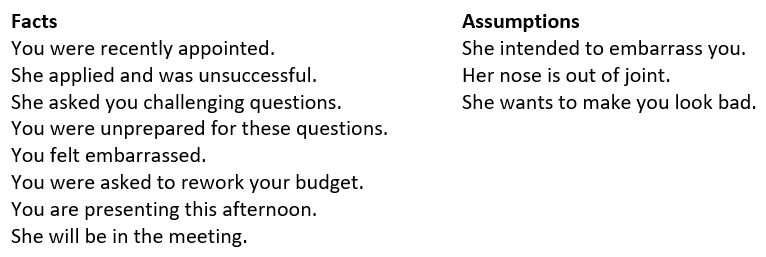- Whether we believe the world is basically a safe place OR that the world is full of danger;
- Whether we believe that people are basically good and well-intentioned OR basically bad and self-serving;
- Whether we believe that we are deserving OR that we are not deserving.
Assumptions tend to be most problematic when they drive our most unhelpful behaviours. When we find ourselves triggered or upset by the behaviour of others, it is often as a result of the assumptions we have made – and often our assumptions are related to their intentions.
What happens is that we tell ourselves stories about what another person’s behaviour might mean -and sometimes these stories can be quite elaborate!
Let’s understand what an assumption is:
it is accepting as the truth a belief for which you have no proof.
Can you see how your choice of assumption is determined by the core beliefs I’ve listed above? If you believe that people are basically good and that the universe is basically supportive, your assumptions about other people and their intentions will tend to be either innocuous or generous. If you believe that people are basically bad, or that the universe is out to get you, your assumptions will be negative.
How can you tell when your reactions are being driven by your negative assumptions? The most common indicator for me is when a client uses the word “obviously” and then tells me something that they believe about another person’s intentions. That is a cue for me to ask “What is obvious about your interpretation”? You will know that your reactions are being driven by negative assumptions when you ruminate about a situation and the players in that situation.
Let me use an example:
You were recently appointed as head of your division. You presented your divisional budget in the executive meeting last week. In that meeting was a colleague who also applied for your position – unsuccessfully. She asked you some challenging questions about your budget that you were not prepared for, and you felt embarrassed. You have spent the last week ruminating about the fact that she intended to embarrass you; that she only asked these questions because her nose is out of joint for not being appointed. You need to present your budget again because her questions necessitated some rework. You are anxious that she will find some other way to make you look bad when you do so this afternoon.
What aspects of the scenario I have described are facts, and which are assumptions for which you have no proof?
- You can do NOTHING and carry on getting yourself bent out of shape;
- You can test your assumptions with the person about whom you are making assumptions. You could say to them “When you questioned my budget in the way that you did, I felt embarrassed. The story I told myself is that you were trying to make me look bad because I got the job that you wanted. Is that what was happening?” And then you will need to listen and have a constructive conversation.
- You can remind yourself that you are probably telling yourself a story, and then you can attribute more generous assumptions to your colleague: she has the interests of the business at heart; she was sincere in asking those questions and she was right because I hadn’t thought about those things; she has always been a good colleague and I don’t see any reason why that would change.
Option 1 is a bit of a loser’s game – it is a choice to be the victim of your story. Option 2 is great, but might turn out to be a completely unnecessary conversation – which you may find out if you just exercise Option 3. While there is no proof of the more positive and generous assumptions I’ve offered in 3 above, they simply lead to more productive engagements with your colleague than the original negative assumptions. Just assuming the best of people leads to positive outcomes (even if they themselves were not being as generous in their behaviour as you have assumed).
The way to test your assumptions is to ask yourself the following:
- Is it logical based on what you know about yourself, the other person or the situation?
- Is it a fact? Do you have evidence for it?
- Is it based on a positive philosophical choice? Positive philosophical choices are that the universe is supportive, people are basically good, and you are deserving of all good.
If your assumption is not logical (makes no sense), change it to an assumption that does make sense. If you have no evidence for your assumption, replace it with a positive assumption. If your assumption is based on a negative philosophical choice, replace it with something that is based on a positive philosophical choice.
The key to any change starts with self-awareness. Pay attention to yourself when you get upset or triggered. Are you telling yourself a story based on negative assumptions? If so, the attached downloadable document will take you through a process that will enable you to test your negative assumptions and replace them with more constructive and positive assumptions that not only make you feel happier, but also foster productive engagements with your colleagues, family and friends.
The pdf below will take you through a guided process of testing your unhelpful assumptions. Give it a try!
Reference:
Kline, Nancy. Time to Think. Octopus Books. United Kingdom. 1999
| testing_assumptions_worksheet.pdf |


 RSS Feed
RSS Feed


